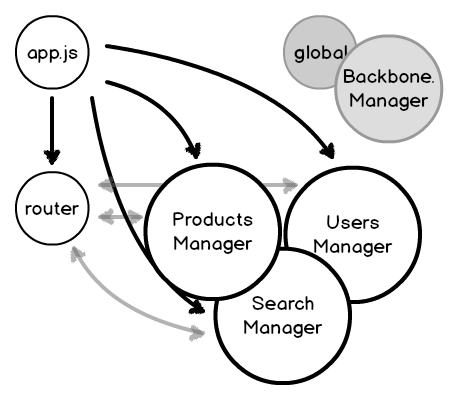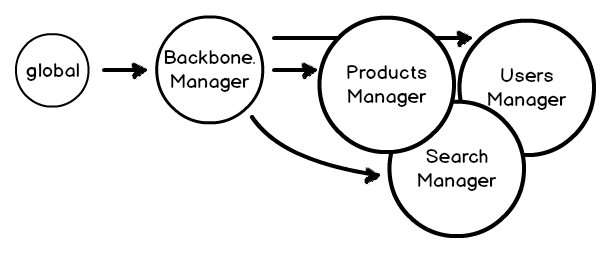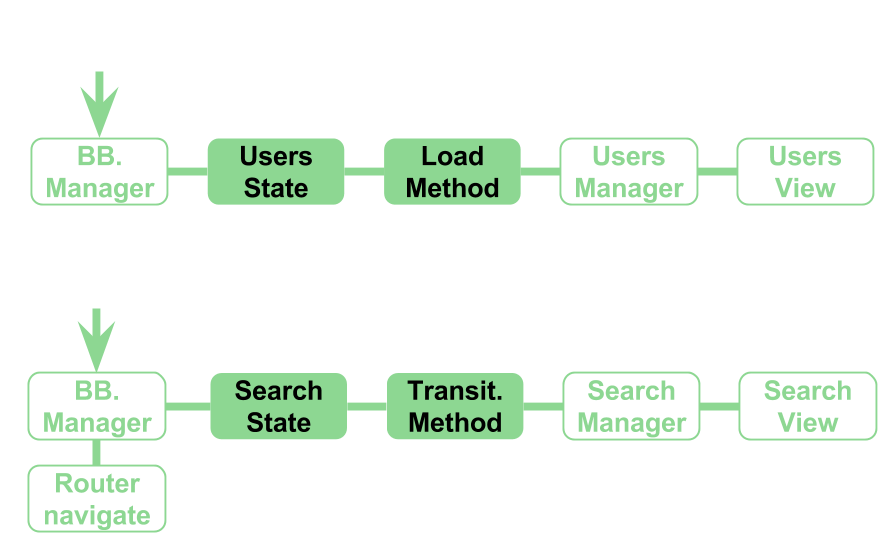Backbone.Manager
Goals
- Intuitive state change description
- Differentiate between pageload and triggered changes
- Remove temptation of view<->router relationships
- Easily keep view swaps within a SPA
- Allow anchors to indirectly trigger a state change
- Conventional state change from anchor href's
- Programmatic state change ability
- Lots of bullet points for a presentation
Managing State
Router Managing State Changes
UsersRouter = Backbone.Router.extend
routes:
users: 'showUsers'
'users/:uuid': 'showUser'
initialize: (options) ->
_.bindAll @, 'switchToUsers', 'switchToUser'
@listenTo Backbone, 'showUsers', @switchToUsers
@listenTo Backbone, 'showUser', @switchToUser
Manager Managing (haHA!) State Changes
UsersManager = Backbone.Manager.extend
states:
'users.detail':
url: 'users/:id'
loadMethod: 'showUser'
transitionMethod: 'switchToUser'Manager Details
Backbone.Manager =
states: # the foundation
users.detail: # state name
url: 'users/:id' # (optional) used in History matching and updating
# will update browser url on state transition
loadMethod: 'showUser' # (optional) name of pageload callback
# url must be defined to activate
transitionMethod: 'switchUser' # name of state change callback
# Arguments are built from url params
showUser: (id) ->
# all of Arguments except Options are either provided by automatic
# trigger if url is defined, or passed through directly from go() call
#
# Options currently only contain the filled in url, so in this case:
# Options = {url: 'users/1'}
switchUser: (id, options) ->
App Structure

Manager StructUre

State Flow

State Change Triggers
Three Ways
1.
navigate to a state's url
3. click on
< a data-bb-state = "" />
Backbone.Manager.go
The Programmatic Option
events:
'click dd': 'showUser'
showUser: ->
Backbone.Manager.go('users.detail', {id:1})
params:
- state name
- args: [] or {}
- passed into transitionMethod as Arguments
- uses values of [] or _.values of {}
- order important only in [] for optional state url
- [1, 2] for url '/u/:a/p/:b' = /u/1/p/2
- {b : 2, a : 1 ] for url '/u/:a/p/:b' = /u/1/p/2
data-bb-state
The Automatic Option
<a data-bb-state='users.detail([1])'/>
<a data-bb-state='users.detail({id:1})'/>
<a data-bb-state='' href='/users/1'/>All match to users.detail state name
All trigger users.detail.transitionMethod on click
Params work the same as .go()
's args
HREF Parsing Convention
Auto url -> state translation examples:
- /users -> users
- /users/1 -> users.detail
- /users/1/favs -> users.detail.favs
- /users/1/favs/2 -> users.detail.favs.detail
- /books/1/2 -> books.detail.2 (not good)
-
use data-bb-state='books.detail.chapter([1,2])'
instead
The * State
Backbone.Manager.extend
states:
'*':
url: '*url'
transitionMethod: 'defaultTransition'* is triggered by the data-bb-state watcher if the conventional state it creates from href doesn't exist
should be declared before any other states
Order Matters
Backbone.Router limitations...
Manager integrates with a router, inserting routes based on states, starting at the top. So...
last declared url is first to match
.
states:
a:
url: 'a/:id'
b:
url: '*'states:
b:
url: '*'
a:
url: 'a/:id'
Manager Events
-
pre-load = incoming page load call for all states
-
pre-load:[state] (args) = incoming page load call for the state
-
post-load = incoming page load call completed for all states
- post-load:[state] (args) = incoming page load call completed for the state
-
pre-transition = incoming transition call for all states
-
pre-transition:[state] = incoming transition call for the state
-
post-transition = transition call completed for all states
-
post-transition:[state] = transition call completed for the state